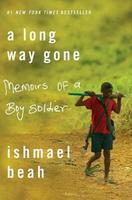
|
|
| photo: John Madere | |
Ishmael Beah was born in Sierra Leone in 1980. He came to the United States when he was 17 and graduated from Oberlin College in 2004. He is a UNICEF Ambassador and Advocate for Children Affected by War, a member of the Human Rights Watch Children's Rights Advisory Committee, and president of the Ishmael Beah Foundation. He lives in Brooklyn, N.Y.
Radiance of Tomorrow, a novel, follows your 2007 memoir A Long Way Gone. What did you find to be the challenges, and conversely, the rewards of writing fiction after writing memoir?
I have written fiction before; short stories mostly. However, this was the first time that I embarked on writing a novel. I wanted to discuss a much neglected but very important question about what happens after war--why and how do people return home, the struggles of trying to return to the country and people they had been, to repair their traditions and find the simplicity that once defined them.
There was one commonality in writing a novel and a memoir, and that was the quest of finding the English equivalent of the many languages spoken in Sierra Leone. Both works were set in places with remarkable richness in language, gestures, sounds that were difficult to describe using the medium of English. I do like the challenge, though, and came out satisfied each time.
With the memoir, there were restrictions with the rendering of the timeline but the beauty and reward was discovering that the experience had its own natural structure. It was also very personal and hence difficult emotionally to return to what had happened and relive it so as to bring it to life for the readers. On the other hand, with fiction there was more freedom to play with language, timeline and explore the imagination while looking at the many truths of all the characters involved. I could distance myself from things. I find joy in writing, so for me it doesn't really matter whether it is fiction or nonfiction. The discovery of language intrigues me every time.

Writers are always measured up against the success of the work that introduced them to the world and as such readers and critics would want to read something of either the same caliber or better. Of course, I will never write another A Long Way Gone but I will always work extremely hard to give my readers something worthwhile reading and remembering. Thus for me, it isn't necessarily the pressure to match the success of a previous work but rather to challenge myself to do better at my craft. I write each story, each book with fierceness, urgency, intelligence and meticulousness that the truth of that particularly story commands. I do not count on the fact that I had written something successful before. I always write as though what I am working on is the first and last story I will ever write. That is how I challenge myself to do better.
One of the strongest themes in Radiance of Tomorrow is the nature of and line between good and evil and how one informs the other. Can you explain how that theme developed for you?
In a post-conflict setting, everyone who returns has experienced and/or participated in violence. Because of these experiences, all the characters are aware of the possibilities of becoming truly good or evil. We can all access those parts of evil and goodness if we find ourselves in circumstances that push us to embrace either one. And sometimes it becomes the way to live in certain situations.
So the theme of good and evil develops around the fragility of things after war when everyone is moving towards a future while the past is tugging at them.
For example, the most challenging character to write was Colonel. I had to walk on a fine line between explaining that his experiences in the war had given him a characteristic and insight that he could use beneficially but without celebrating or endorsing violence as a solution to or as a form of resisting what life threw at him. I had to show his intelligence in the decisions he made, whether they are perceived as violent or otherwise.
In your author's note, you discuss trying to bring elements of oral tradition (specifically from your childhood community in Sierra Leone) into the language of this novel. Can you describe that process for us?
The oral tradition of my childhood was my first introduction to the narrative form. When you share a story orally, you have to capture the imagination of the listeners and bring them to the landscape of the story so that they can feel, smell, hear and be a part of it as intimately as possible. You have to use images and words that will leave prints on the mind of your listener. And this is possible through a careful usage of language, of parables, adages, of personifying even nature to color whatever is unfolding in the narrative. So when I write, I utilize some of these elements, using the beauty of my languages and their various expressions to spark the imagination.
The novel has such a strong sense of place, particularly because of the characters' way of speaking, with words and phrases taken from the languages of Sierra Leone.
All the characters are very complex in the sense that they are dealing with the past while trying to grab onto something in the future while living in a present that is fragile and difficult. Some are young, but with experiences that had provided them knowledge beyond their years. There is a tug of war between the old ways and something new that no one really has a strong grasp of. Thus, the language and the characters play a role in their manners of speaking to posit that. I couldn't tell the story any other way, as the characters demanded this way of expressing themselves.
Reading a novel is a unique experience for each reader--and readers often find themes and connections in a work that the author may not have realized was there or, conversely, not see those that the author intended. What is the one thing you hope readers will not miss in Radiance of Tomorrow?
The importance of preserving what means the most in uncertain times. --Debra Ginsberg

